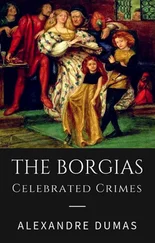Burchard recorded daily bulletins on the pope’s health. On August 12 he wrote that ‘His Holiness shows signs of a fever which does not abate.’ The next day Giustinian reported to Venice:
The Pope vomited yesterday evening and has been feverish all night; and Duke Cesare is in a similar condition. The doctors attend constantly and are considering whether or not to bleed… some of my informants talk of fourteen ounces of blood taken away; others of sixteen ounces. Perhaps ten ounces is more likely; and even that is a great quantity for a man of the age of His Holiness. But, great or small, it has had no effect and the fever does not abate. As for Duke Cesare, he is worse.
Costabili sent a similarly dispiriting report to Ferrara:
Yesterday morning I was told on good authority that His Holiness has summoned the Bishop of Venosa and another physician; and that these are not allowed to leave him. I was told that the Pope was feverish and vomiting yesterday, and that they have taken nine ounces of his blood… During the day His Holiness asked some of the cardinals to play cards in his room while he rested… But this afternoon there was a crisis such as there was on Saturday and this makes his attendants uneasy. Everyone is unwilling to talk of his condition; and the more I seek, the less I am told. The physicians, surgeons and apothecaries are not allowed to leave him from which I deduce that his condition is grave.
The same news was sent by other envoys to their various states. Giustinian was particularly assiduous in this respect, reporting on August 16, 1503: ‘Early this morning Our Lord the Pope, well aware that his illness is dangerous, received his rites; and some cardinals have been admitted into his bedchamber; the viaticum was given in secret, for those about him try to conceal his condition as much as they can.’ The bishop who had administered the rites ‘left the room in tears saying that the danger was very great and complaining of the ineffectiveness of the medicines that have been administered.’
By now Alexander VI was in a high fever and was violently sick during the night. He was bled so copiously that Giustinian was shocked to hear of it. Cesare also had been severely bled before being plunged into a bath of ice-cold water, from which he emerged with the skin peeling from his back. Both father and son were still feverish the next morning, so Giustinian was told, the duke ‘more severely with recurrent paroxysms of fever one after the other and strange fits,’ and Giustinian added that Cesare had ‘sent for the doctors who are looking after him and he will not let them leave, and is insistent that his condition must not generally be known.’
The following day, Friday, August 18, Alexander VI died; as Burchard commented, he had ‘made his confession to the Bishop of Carignola who then said mass in his presence and, after the Bishop had taken communion himself, he offered the sacrament of the Eucharist to the Pope in his bed.’ After the Mass the pope told the cardinals gathered around his bedside ‘that he felt very poorly.’ The cardinals evidently left the room shortly afterward; the pope ‘received Extreme Unction from the Bishop of Carignola at the hour of Vespers and died with just the Bishop, the Datary and a papal groom present.’
Cesare was informed immediately of his father’s death. Although he was giving his doctors some hope that he would recover, Cesare was still desperately ill and very weak, barely capable of making the decisions and issuing the orders that the crisis now demanded. Fortunately for him, his loyal lieutenant, Miguel de Corella, was already in the palace and able to act on his master’s behalf.
Keeping the news a closely guarded secret, Corella now took a party of men and locked all the doors leading into the papal apartments. He then marched into the pope’s bedchamber, where he found Cardinal Casanova and, holding a knife to his throat, threatened to cut it open and throw him out of the window if he did not hand over the keys to the cupboards and closets, where, Cesare had informed him, a large sum of money was stored. The terrified cardinal handed over the keys without protest, whereupon Corella and his men unlocked the chests and appropriated the money and silver they contained; according to Giustinian’s report to the Venetian Senate, they removed coins, silver, and jewels worth 500,000 ducats.
Corella now made the public announcement that Alexander VI was dead, and immediately the pope’s servants ran into the apartments to help themselves to the clothes they found in his wardrobe and other items. Nothing of value was left, so Burchard said, ‘except the papal chairs, some cushions and the tapestries nailed to the walls.’
Though, in fact, when the cardinals came to make an inventory of the pope’s possessions a few days later, they found a lot of ‘silver, jewels and precious objects,’ according to Burchard, items that Corella had overlooked or, perhaps, had been hidden by the pope even from his own son. ‘They found the tiara, two valuable mitres, all the rings which the Pope used at mass, and all the sacred vessels the Pope used when he officiated at mass, which filled eight large coffers.’ According to Burchard, they also found a ‘cypress chest covered with green tapestry, which too had escaped Corella and his men, inside of which they found precious stones and valuable rings worth 25,000 ducats.’
It was not until early evening that Burchard himself was informed of the pope’s death, and the loyal master of ceremonies hastened into the papal apartments. ‘After I had seen the Pope’s body,’ which had already been washed, ‘I clothed it in red brocade vestments, with silken amice and chasuble.’ He could not find the pope’s shoes but did find a pair of slippers properly embroidered with crosses ‘and two strings that I used for binding them to his feet,’ but he was unable to replace the pope’s missing ring, which had, no doubt, been ripped off his finger by Corella and his men. Burchard then had the corpse put on a bier in the antechamber before being taken into the Sala del Pappagallo, where it was placed on a table covered with a crimson cloth and ‘a piece of fine tapestry’; and four monks began to recite the Office of the Dead.
Messages were sent to all the cardinals, instructing them to assemble in the Church of Santa Maria sopra Minerva the next morning, and to all the clergy in Rome, instructing them to gather for the funeral procession from the Sistine Chapel to the Basilica of St Peter’s the following day. With an escort of cardinals, monks, clerics, and the canons of St Peter’s, as well as members of Alexander VI’s household, many of whom carried the 140 tall wax tapers that accompanied the procession, the pope’s bier proceeded into St Peter’s. The bier itself was carried, as was the custom, by a number of paupers who were traditionally rewarded with a token sum for this service, a service that was performed on this occasion with more reverence than that displayed by the clerics, who, according to Burchard, ambled along beside the bier ‘in disorderly fashion.’
There was further unseemly behaviour inside the basilica, where, while the prayers were being chanted, the palace guards set upon the members of the procession in order to seize the tall wax tapers that they were carrying. The clergy fled to the sacristy, abandoning the pope’s body, while Burchard, ‘with the help of three others,’ so he recorded, ‘took hold of the bier and moved it into a position behind the high altar.’ Even here it did not seem safe; the bishop of Sessa ‘wondered if the angry people might not climb up to reach the body and someone who had been wronged by the Pope would get his revenge; so the bier was moved behind the iron grille of the chapel entrance and there the body remained throughout the day, with the iron grille firmly closed.’
Читать дальше











